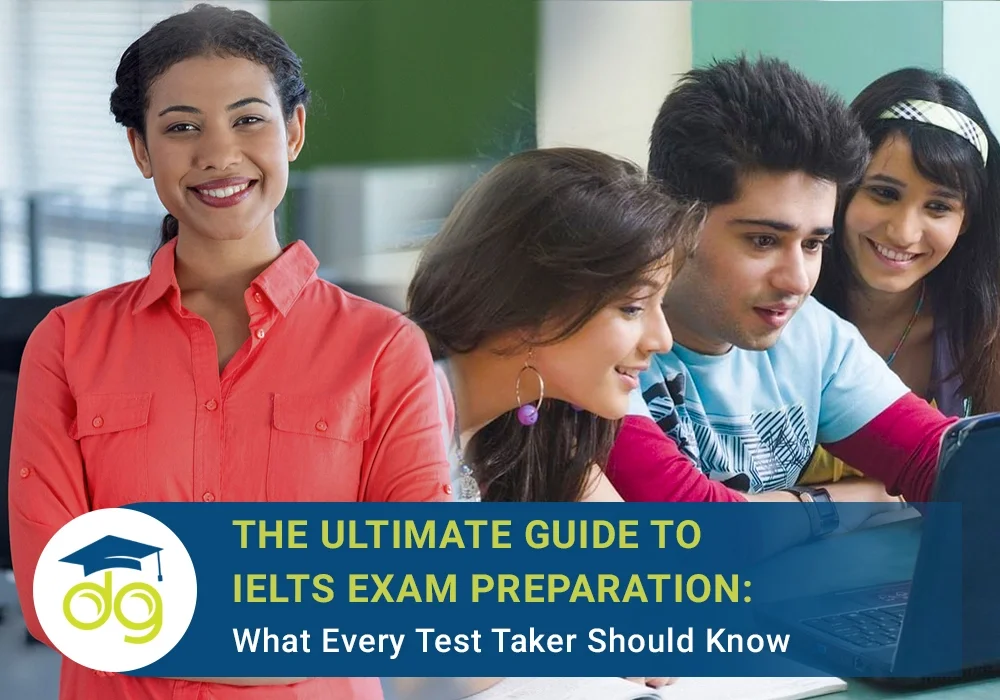The Guide to IELTS Exam Preparation: What Every Test Taker Should Know
Comprehensive Strategies and Tips to Master the IELTS Exam for High Scores
The International English Language Testing System (IELTS) has come out to be the major gateway for ambitious non-native English speakers those who are armed with the vision to come and study, work, or for migration to countries with English as an official language of communication. The British Council, IDP Education together with Cambridge Assessment English are the responsible organizations for IELTS administration. The test provides the candidate with a grading system that rates their proficiency on a global scale ranging from zero to nine grades. The exhaustive use of the IELTS by over 10,000 institutions at all levels, including those academic, private, and government, across the world enables you to know the possible questions to be asked and this, helps you have good grades.
In this blog, we will be laying the foundation for the major points and the revision strategies that help you ace your IELTS exam. It describes different sections of the test including "Listening", "Reading", "Writing", and "Speaking" parts, and provides relevant tips for attaining perfection. Whichever way you approach preparations for IELTS Academic or General Training, this resource will give you the necessary tips and understanding of the exam to improve your speaking, listening, and academic English. With the help of official IELTS materials and practicing your work over and over again, you will be able to view from different approaches the ways of dealing with the assessment and not getting nervous.
Understanding the IELTS Format
Versions and Modules of the IELTS Exam
The IELTS exam is structured into two main versions: the Academic and the General Training. Both versions are graded similarly and are designed to assess your English language proficiency across four key skills.
IELTS 2024 Eligibility Criteria & Exam Structure:
|
Aspect |
Details |
|
Eligibility Criteria |
- Age: Candidates must be at least 16 years old. - Education: Minimum qualification is 12th class (high school). - Nationality: Open to applicants from any country. - Documents: A valid passport is mandatory. |
|
Exam Overview |
- Exam Name: International English Language Testing System (IELTS) - Test Levels: IELTS Academic and IELTS General - Conducting Bodies: British Council & IDP Education - Test Modules: Listening, Reading, Speaking, and Writing - Test Duration: 2 hours and 45 minutes - Modes: Available in both online and offline formats throughout the year |
|
IELTS Academic |
- For students pursuing higher education abroad - Assesses language skills relevant to academic contexts |
|
IELTS General |
- For individuals seeking permanent residency (PR) in other countries - Focuses on practical language skills for daily life and work |
|
Scoring System |
- Scores range from 0 to 9 in each module - Overall score is the average of all module scores |
Breakdown of the IELTS Exam Sections
The IELTS test comprises four distinct sections: Listening, reading, writing, and speaking. Every section assesses at least one of the elements of English you possess.
Listening: This passing consists of four recorded conversations and monologies of native English. At the end of the session, you will have to complete 40 questions and, the next step is to transfer your answers on the answer sheet within 30 minutes and 10 minutes (approximately) respectively. It is the difficulty that is getting more challenging as we move on.
Reading: This part varies depending on which of the two modules an individual selects. For the General Training module that covers different kinds of texts, on the other hand, there are different types of text. 40 questions to respond to during the 60-minute time limit is your job. Formal Academic texts are much more complex in terms of their nature.
Writing: This section includes two elements for you. The first task will be to write a 150-word message (the letter or the graph description). As for the second one – you have 250 words to create an essay. For such two versions of enjoy general training and academic audiences, there is a small slaving difference in the content.
Speaking: Consistency has been maintained in the second version as well. This is the individual interaction with the examiner in the form of an interview, 11-14 minutes in duration. This is a great resource that will help you develop public speaking skills. Stage one involves an introduction, stage two covers a speech on a given topic, and stage three entails discussion.
Timing and Sequence
The time limit for the entire IELTS exam is less than 3 hours. The (LRW) sections take place in succession without breaks on the same day. The Speaking test may occur on the same day or up to a week earlier or later.
Scoring System
IELTS outputs are availed in full and half-bands from a score chart of 0 to 9. All the components of the test in the aggregate constitute your band score, which is an average of the four sections.
Strategies for Listening
Familiarization with Accents
To get success in the IELTS listening section, you must get familiar with multiple accents of English. Acquiring an accent of Great Britain, America, Australia, Canada, and New Zealand will give you the widest scope for recognizing various pronunciations.
Active Listening and Practice Techniques
- Active Listening: Develop your concentration by practicing active listening. This involves fully focusing on the audio without distractions, which is crucial for the IELTS listening section.
- Use of Official Practice Tests: Regularly practice with official IELTS materials provided by The British Council, IDP, and IELTS Official. This helps in getting accustomed to the test format and timing.
- Simulated Test Environment: Engage in full-length IELTS Listening mock tests to mimic the actual test conditions. This practice helps in managing time and understanding the test dynamics better.
Effective Note-Taking Strategies
Shorthand Techniques: Learn shorthand or develop your system of symbols to quickly jot down important information during the listening test.
Structured Note-Taking: Organize your notes by using bullet points or dividing your paper into sections that correspond to different question types. This organization aids in quickly locating information during the answer transfer phase.
Handling the Test Day
- Early Arrival: Make sure to arrive early at the test center. Use the extra time to read and understand the test instructions carefully.
- Answer Transcription: Practice transferring your answers to the answer sheet efficiently. Remember, answers can be written in all capital letters if preferred for clarity.
Tactical Approaches to Listening Tasks
Predictive Listening: Before the audio starts, try to predict the topic and possible questions by reviewing the title and any accompanying pictures. This prepares you for the type of information to listen for.
Focus on Keywords: Identify and concentrate on keywords in the questions. Listening to synonyms and antonyms used in the recording can also provide clues to the answers.
Review and Adjustment
- Review Techniques: After practicing, review your answers thoroughly. Identify common mistakes such as misunderstandings due to accent or speed, and adjust your practice accordingly.
- Continuous Practice: Engage with English audio materials daily. Diverse sources like podcasts, news reports, and academic lectures will improve your general listening skills and prepare you for the variety of topics covered in the IELTS.
Improving Reading Skills
Effective Reading Strategies for IELTS Success
Time Management: Allocate your reading time wisely. Aim to complete the first section within 15 minutes, allowing extra time for challenging questions later.
Reading Techniques: Master skimming for gist and scanning for specific information. These techniques are essential for efficient time use during the test.
Keyword Focus: Pay attention to keywords in both the questions and passages. Highlighting these can help speed up the process of finding relevant information.
Following Instructions: Carefully follow all instructions, especially regarding spelling and capitalization, to avoid unnecessary errors.
Strategic Answering: Tackle easier questions first and mark difficult ones to revisit with any remaining time. This approach ensures you answer as many questions as possible.
Regular Practice: Engage in consistent practice with IELTS reading materials and actively seek feedback to improve.
Speed Reading: Develop your reading speed by practicing with a wide range of texts. Learning to read phrases rather than individual words can significantly increase your speed.
Understanding Sentence Functions: Learn to quickly identify the main function of each sentence within a paragraph, which can help in answering comprehension questions more accurately.
Utilizing Practice Resources: Try as many mock exams that have been provided by the British Council and IELTS sites as possible. utilize the official website of the gov to fam yourself with the exam model and the kinds of questions.
Addressing Weaknesses: Find out your area of strength using practice tests and then concentrate your preparation on the traits of your weakness only.
Embed these techniques in your learning habits to obtain a better score on your IELTS reading test.
Writing Section Preparation
Essential Steps for IELTS Writing Preparation
Understand the Assessment Criteria
Get used to the IELTS Writing assessment criteria map that covers the task response, coherence, lexical resource, grammar appropriate, and accuracy. This understanding is crucial to producing essays that meet the band 8 criteria.
Organize Your Essays Effectively
Make sure every essay you write is well structured and that it flows logically with the use of transition phrases. Make use of paragraphs to divide the essay into different sections of clear distinct topics, on which you are to elaborate, to the point.
Enhance Your Vocabulary
Use a diverse and less common vocabulary, ensuring correct spelling. Avoid memorized phrases and ensure the use of a variety of complex sentence structures to enrich your writing.
Preparation Strategies by Test Type
- Prepare by Test: Tailor your preparation based on the specific IELTS module you are taking—Academic, General Training, or UKVI.
- Practice Tests: Utilize free practice tests and tools like IELTS Progress Check to assess your writing skills.
- Skills Development: Focus separately on enhancing skills for IELTS Listening, Reading, Writing, and Speaking.
- Test Day Tips: Familiarize yourself with test day strategies to optimize your performance.
Time Management for Writing Tasks
|
Task |
Time Allocation |
Activities |
|
Task 1 (20 minutes) |
2 min |
Read the question carefully |
|
3 min |
Map out ideas |
|
|
10 min |
Draft the response |
|
|
2 min |
Review for logical flow |
|
|
3 min |
Proofread and finalize |
|
|
Task 2 (40 minutes) |
2 min |
Read the question carefully |
|
3-5 min |
Map out ideas |
|
|
23 min |
Draft the response |
|
|
5 min |
Review for logical flow |
|
|
5 min |
Proofread and finalize |
Additional Writing Tips
- Regular Practice: Write regularly on a variety of topics within the time limits to build speed and familiarity with the IELTS format.
- Grammar and Structure: Put in the effort to enhance your grammar, increase your vocabulary, and develop logical thinking.
- Extensive Reading: Read through different genres defining more complex sentence structures and infusing with different sets of vocabulary like newspaper, books, and online content.
- Mock Tests: Engage in complete and sectional mock tests to enhance your writing speed and adapt to the test pattern.
By integrating these strategies and focusing on continuous improvement, you can significantly enhance your performance in the IELTS writing section.
Mastering the Speaking Section
Techniques for Effective Communication
Vocabulary Utilization: Vary your vocabulary comprehensively based on the subject of your concern, to show your linguistic skills. Being flexible with new vocabulary will lead to your linguistic adaptability.
Grammatical Diversity: Concentrate on different grammatical structures which will certainly illustrate your comprehension as well as mastery over the language.
Natural Interaction: Rather than memorizing responses, engage in the conversation naturally and responsively to maintain authenticity in your language use.
Enhancing Pronunciation and Fluency
- Pronunciation Practice: Constant practice of speech pronunciation and intonation is the key to ensure no misunderstanding and retain the attention of the audience.
- Use of Natural Fillers: Use standard expressions such as 'I think', 'maybe', and 'perhaps' to your speech sound and feel easier and more natural.
Building Confidence and Response Quality
Extending Responses: Elaborate on your answers by providing detailed information, which helps in demonstrating your language proficiency without waiting for further prompts from the examiner.
Emotional Expression: Show emotion in your voice to convey enthusiasm and engagement, which can positively impact the examiner's perception of your communicative abilities.
Strategic Preparation and Practice
- Topic Familiarization: Prepare for common IELTS topics such as family, hobbies, and interests by discussing these subjects in English with friends or family to build confidence and fluency.
- Mock Interviews: Conduct practice sessions that mimic the real exam environment to improve your adaptive response strategies and timing.
Day Before and Test Day Tips
- English Warm-Up: Engage in a full day of English conversation before the test day to get into the rhythm of the language.
- Question Clarification: Don’t worry about asking for the question repetition from the examiner if you have trouble comprehending the question, as a way of ensuring it is clear to you and you respond accordingly.
You can give an extra advantage by having virtually all methods mentioned in your preparation for comfort and convenience in speaking part of IELTS which usually asks very drastic questions.
Practice Tests and Review
Recommended Resources and Practice Techniques
Utilize Official Preparation Materials
Engage with resources like The Official Cambridge Guide to IELTS, Barron's IELTS Superpack, and the Cambridge IELTS 11 Self-Study Pack for comprehensive study guides and practice tests.
Online Learning Tools
Explore online platforms such as the British Council, IELTS.org, and the IELTS Liz YouTube channel for interactive learning and updated practice materials.
Regular Mock Tests
Schedule regular mock tests to assess your progress. This helps in familiarizing yourself with the exam format and timing, thus reducing test-day anxiety.
Effective Review Strategies
Expand Your Language Skills
Improve your English proficiency by consistently practicing grammar, and sentence structures, and expanding your vocabulary. Regular reading and listening to English media can significantly enhance language fluency.
Strategic Time Management
Develop efficient test-taking strategies including time management skills. Practice pacing yourself during mock exams to ensure you can complete all sections within the allotted time.
Continuous Improvement and Feedback
Seek Constructive Feedback
After each practice test, seek feedback to identify areas of improvement. This can be through peers, mentors, or online forums and communities.
Adjust Study Habits
Based on the feedback, adjust your study habits to focus more on weaker areas. Whether it's enhancing vocabulary, improving grammatical accuracy, or developing better listening skills, targeted practice is essential.
Table: Key Resources for IELTS Success
|
Resource Type |
Examples |
Purpose |
|
Books |
Official Cambridge Guide, Barron's Superpack |
Comprehensive understanding and practice tests |
|
Online Platforms |
British Council, IELTS.org |
Interactive exercises and up-to-date materials |
|
YouTube Channels |
IELTS Liz |
Visual learning and expert tips |
|
Mobile Apps |
Official Cambridge Guide IELTS 4+ |
Practice on-the-go |
Implementing these techniques and resources will prepare you adequately for the IELTS exam. You will be polishing your English language competence, thus increasing your chances of obtaining higher marks on the exam.
Conclusion
In this detailed guide, we succeeded in covering the vital parts and strategies that play an indivisible role concerning IELTS exam mastery. For example, in assessing specific sections, Listening, Reading, Writing, and Speaking, we have gone through the stages of learning, talking about the necessary resources and stressing the point of how constant training and knowing the test structure is vital. This guide also underscored the usefulness of employing authentic test preparation materials and taking simulation exams to strengthen one's confidence and measure the progress of their English language skills.
As we conclude, it's crucial to remember that achieving success in the IELTS exam hinges not only on comprehending the test format but also on an ongoing commitment to enhancing one's English language skills across all fronts. The strategies and resources shared herein serve as a foundation upon which to build a structured preparation plan. Continuous improvement, coupled with strategic practice, will empower test-takers to approach the exam with confidence and the competence necessary to attain their desired score, thereby opening doors to global opportunities in academia, professional ventures, and beyond.
Make sure to check out Skoodos Bridge, for questions and information on Coaching Institutes, including cost plans, specifics, and more.
Categories
Archives
- October 202518
- September 202520
- August 202522
- July 202524
- June 202524
- May 202526
- April 202530
- March 202523
- February 202513
- January 202523
- December 202429
- November 20246
- September 20245
- August 202422
- July 202415
- May 20249
- June 202424
Similar Posts

WhatsApp Group Study: Boost Your Competitive Exam Preparation
by Skoodos Bridge

Drone Engineering Careers: Aerospace Pathways, Exams & Job Opportunities
by Skoodos Bridge

Instagram vs LinkedIn: Smart Social Media Strategy for UPSC Aspirants
by Skoodos Bridge

YouTube Shorts for Revision: Micro-Learning to Memorize Formulas Quickly
by Skoodos Bridge

ChatGPT for JEE Physics: Smart Prompts to Master Problem Solving
by Skoodos Bridge

Space Technology Careers: ISRO Opportunities Beyond Aerospace Engineering
by Skoodos Bridge

Digital Detox Strategies for Competitive Exam Students in 2025
by Skoodos Bridge

Subscription Model Coaching vs Traditional Institutes: Netflix-Style Learning
by Skoodos Bridge

Green Engineering Careers: Sustainable Jobs Through GATE, ESE & PSUs
by Skoodos Bridge


Leave a Comment